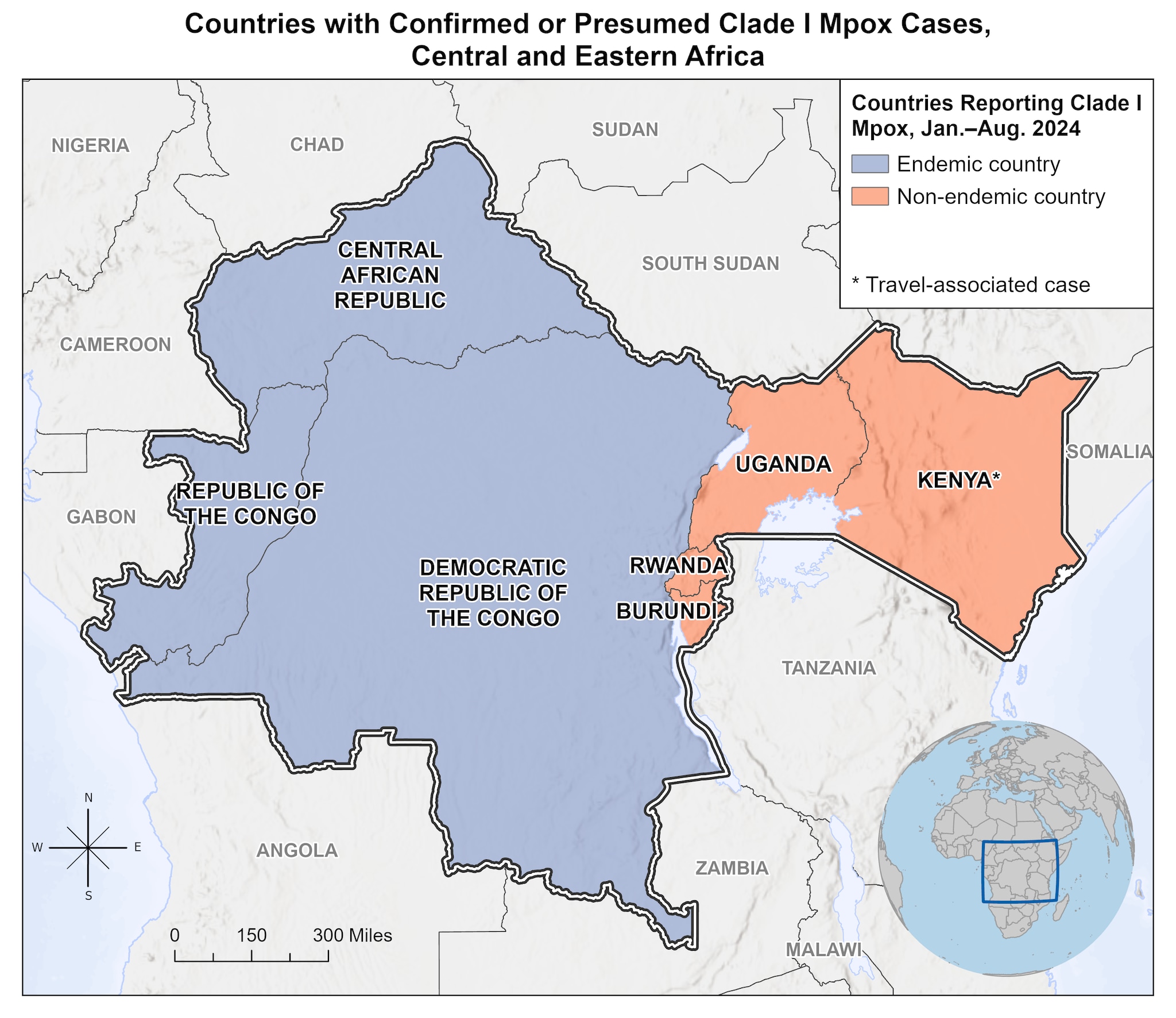What to know
- Since January 1, 2024, the Democratic Republic of the Congo (DRC) has reported more than 47 suspect mpox cases and more than 1,000 deaths.
- Of these, about 9,000 cases have been confirmed through laboratory testing.
- There are two types of mpox, clade I and clade II. Clade I has historically caused a higher number of people with mpox to get severely sick or die compared to clade II.
- The virus that causes clade I mpox occurs regularly, or is endemic, in DRC.
- Clade I mpox has spread to some neighboring countries, including Burundi, Central African Republic, Republic of the Congo, Rwanda, and Uganda.
- There have also been travel-associated cases in Germany, India, Kenya, Sweden, Thailand, the United Kingdom, Zambia, and Zimbabwe.
- The first case of clade I mpox in the United States has been reported. This case is related to the outbreak in Central and Eastern Africa. The risk of clade I mpox to the general public in the U.S. remains low.
- On August 14, 2024, the World Health Organization (WHO) declared the outbreak a Public Health Emergency of International Concern (PHEIC).

- Since January 1, 2024, the Democratic Republic of the Congo (DRC) has reported more than 47 suspect mpox cases and more than 1,000 deaths.
- Of these, about 9,000 cases have been confirmed through laboratory testing.
- There are two types of mpox, clade I and clade II. Clade I has historically caused a higher number of people with mpox to get severely sick or die compared to clade II.
- The virus that causes clade I mpox occurs regularly, or is endemic, in DRC.
- Clade I mpox has spread to some neighboring countries, including Burundi, Central African Republic, Republic of the Congo, Rwanda, and Uganda.
- There have also been travel-associated cases in Germany, India, Kenya, Sweden, Thailand, the United Kingdom, Zambia, and Zimbabwe.
- The first case of clade I mpox in the United States has been reported. This case is related to the outbreak in Central and Eastern Africa. The risk of clade I mpox to the general public in the U.S. remains low.
- On August 14, 2024, the World Health Organization (WHO) declared the outbreak a Public Health Emergency of International Concern (PHEIC).
Situation summary
In the United States
More about mpox cases and outbreaks
The first case of clade I mpox in the United States has been reported. This case is related to the outbreak in Central and Eastern Africa. No additional cases have been reported at this time. CDC is working closely with local and state health authorities to rapidly investigate the circumstances surrounding this first case and prevent any spread.
CDC has assessed the risk to the United States posed by the clade I mpox outbreak in Central and Eastern Africa. The risk to the general population is assessed as low. The current risk to gay, bisexual, and other men who have sex with men (MSM) who have more than one sexual partner, and people who have sex with MSM partners, is assessed as low to moderate. The risk might change as more information becomes available.
Mpox needs close or intimate contact to spread, so it's not spread through casual contact, such as one might have in public spaces like markets, offices, classrooms, or during travel. The best protection against mpox is two doses of the JYNNEOS vaccine if you're eligible. People can also protect themselves by:
- Avoiding close contact with people who are sick with signs and symptoms of mpox, including those with skin lesions or genital lesions.
- Avoiding contact with wild animals (alive or dead) in areas where mpox regularly occurs.
- Avoiding contact with contaminated materials used by people who are sick with mpox (such as clothing, bedding, or materials used in healthcare settings) or that came into contact with wild animals.
- Avoiding eating or preparing meat from wild animals (bushmeat) or using products (creams, lotions, powders) derived from wild animals.
CDC mpox prevention recommendations
Learn more about which activities may put you at increased risk of exposure when you travel to a country where clade I MPXV is spreading: avoid close contact with people who are sick with signs and symptoms of mpox, including those with skin or genital lesions; and avoid contact with contaminated materials used by people who are sick (such as clothing, bedding, toothbrushes, sex toys, or materials used in healthcare settings).
CDC has updated vaccination recommendations for people traveling to countries with clade I outbreaks. Get vaccinated with two doses of JYNNEOS if you anticipate experiencing any of the following: 1) Sex with a new partner 2) Sex at a commercial sex venue, such as a sex club or bathhouse 3) Sex in exchange for money, goods, drugs, or other trade 4) Sex in association with a large public event, such as a rave, party, or festival).
As of September 19, 2024, these countries include: Burundi, Central African Republic, Democratic Republic of the Congo, Republic of the Congo, Rwanda, and Uganda.
In the Democratic Republic of the Congo
There are several outbreaks happening at the same time in DRC, with cases reported throughout the country, in the capital city of Kinshasa, and in some other large cities. In DRC, different provinces have outbreaks with different features. In some provinces, patients have acquired infection through contact with infected dead or live wild animals, household spread, or patient care (transmitted when appropriate PPE wasn't used or available); a high proportion of cases have been reported in children younger than 15 years of age. In other provinces, the cases are associated with sexual contact among men who have sex with men and female sex workers and their contacts. These are the first reported cases of sexual transmission with clade I mpox.
CDC has been supporting DRC mpox research and response for more than 20 years. CDC and other U.S. government agencies are on the ground in DRC helping partners in the country with disease surveillance, laboratory capacity including testing materials, strengthening workforce capacity, case investigation, case management, infection prevention and control, border health, and risk communication and community engagement. DRC has approved the use of vaccines in-country, so CDC is working with other U.S. government agencies and partners on a strategy for vaccination in DRC.
In Central and Eastern Africa
Public Health Emergency of International Concern Declaration

The Republic of the Congo (ROC), which borders DRC to the west, declared a clade I mpox outbreak in April 2024. There have also been confirmed clade I cases in Central African Republic (CAR), which borders DRC to the north. Clade I mpox occurs regularly in ROC and CAR, but the new cases appear to be linked to spread from DRC. In late July 2024, the disease spread to countries that are not known to be endemic for the virus that causes mpox: Burundi, Rwanda, and Uganda, which sit on the eastern border of DRC, and Kenya, which has reported cases of travel-associated mpox only. Although contact tracing is ongoing, some cases have links to DRC. Person-to-person transmission has occurred during this outbreak, including through sexual contact, household contact, and within healthcare settings, when personal protective equipment was not available.
CDC is working with Ministries of Health and in-country partners across the region on disease surveillance, laboratory capacity including testing materials, strengthening workforce capacity, case investigation, case management, infection prevention and control, border health, and risk communication and community engagement.

Global situation
- A case of clade I mpox in a Swedish traveler who visited an affected country in Africa was announced August 15. This was the first clade I mpox case to be reported outside of the African continent.
- Thailand announced August 22 that a traveler to that country from DRC was diagnosed with clade I mpox.
- India announced a clade I mpox case September 25.
- Germany announced a clade I mpox case in October 2024 in someone who'd traveled to an affected country in east Africa.
- The United Kingdom announced 4 cases from the same household in October - November 2024.
- Zambia announced a travel-associated case in October 2024.
- Zimbabwe announced a travel-associated case in November 2024.
- The United States announced a travel-associated case in November 2024.
A single person with mpox is not cause for widespread concern, since public health authorities can quickly identify, isolate, and treat the person or family, and the risk of spread to other people and households can be minimized. Rapid response measures, such as contact tracing and vaccination, can effectively contain disease in these situations.
Notes: Case data reported in humans to WHO since January 1, 2024, are provided for situational awareness and subject to change. Confirmed cases include those laboratory-confirmed as monkeypox virus and may include cases only confirmed as orthopoxvirus. For more information and additional limitations, see WHO-reported data at 2022-24 Mpox (Monkeypox) Outbreak: Global Trends (shinyapps.io).
Source: 2022-24 Mpox Outbreak: Global Trends. Geneva: World Health Organization, 2024. Available online: https://worldhealthorg.shinyapps.io/mpx_global/ (last cited: August 27, 2024)
